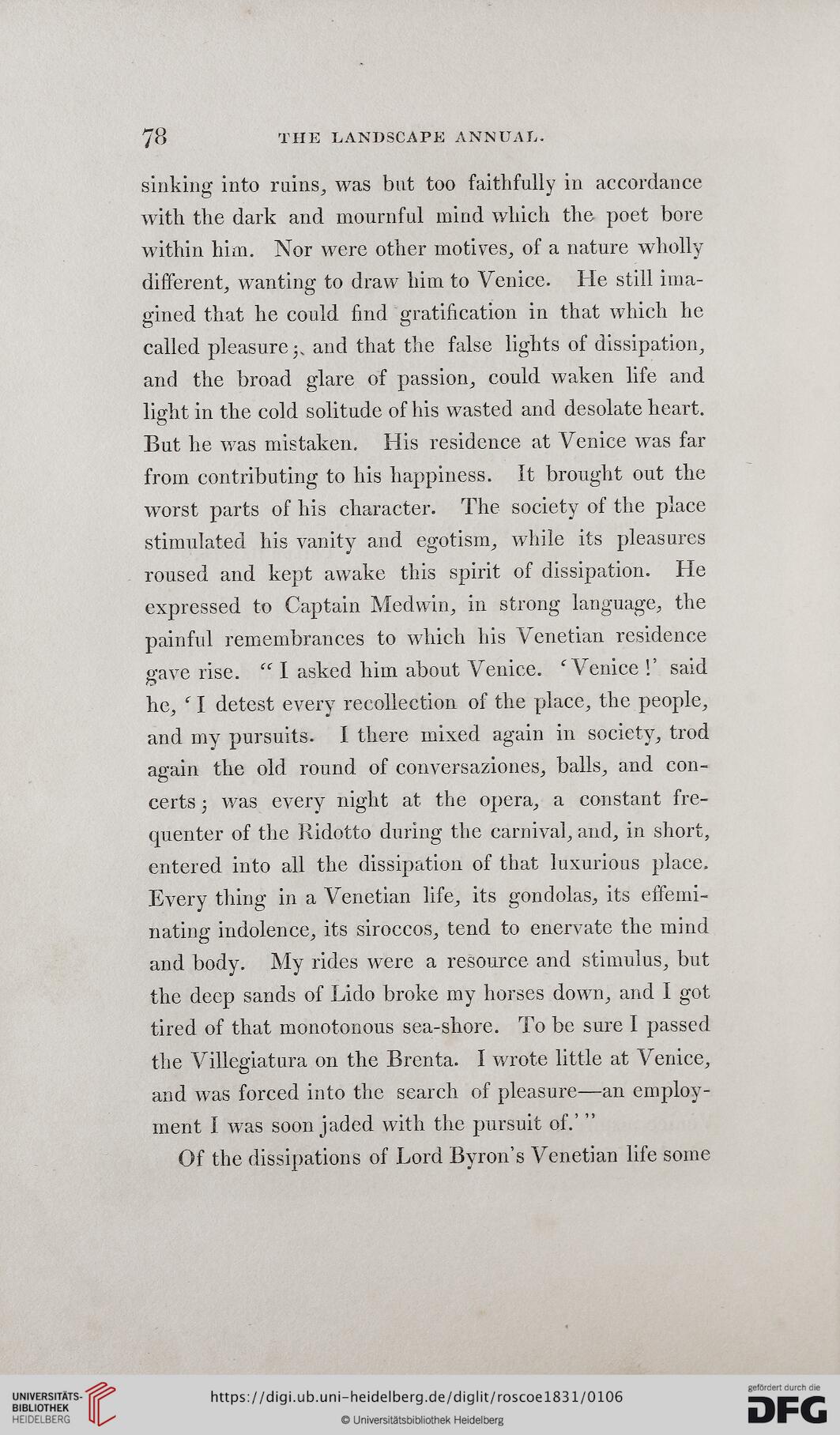78
THE LANDSCAPE ANNUAL.
sinking into ruins, was but too faithfully in accordance
with the dark and mournful mind which the poet bore
within him. Nor were other motives, of a nature wholly
different, wanting to draw him to Venice. He still ima-
gined that he could find gratification in that which he
called pleasure^ and that the false lights of dissipation,
and the broad glare of passion, could waken life and
light in the cold solitude of his wasted and desolate heart.
But he was mistaken. His residence at Venice was far
from contributing to his happiness. It brought out the
worst parts of his character. The society of the place
stimulated his vanity and egotism, while its pleasures
roused and kept awake this spirit of dissipation. He
expressed to Captain Medwin, in strong language, the
painful remembrances to which his Venetian residence
gave rise. “ I asked him about Venice. ‘ Venice !’ said
he, ‘ I detest every recollection of the place, the people,
and my pursuits. I there mixed again in society^ trod
again the old round of conversaziones, balls, and con-
certs ; was every night at the opera, a constant fre-
quenter of the Ridotto during the carnival, and, in short,
entered into all the dissipation of that luxurious place.
Every thing in a Venetian life, its gondolas, its effemi-
nating indolence, its siroccos, tend to enervate the mind
and body. My rides were a resource and stimulus, but
the deep sands of Lido broke my horses down, and I got
tired of that monotonous sea-shore. To be sure I passed
the Villegiatura on the Brenta. I wrote little at Venice,
and was forced into the search of pleasure—an employ-
ment I was soon jaded with the pursuit of.’ ”
Of the dissipations of Lord Byron’s Venetian life some
THE LANDSCAPE ANNUAL.
sinking into ruins, was but too faithfully in accordance
with the dark and mournful mind which the poet bore
within him. Nor were other motives, of a nature wholly
different, wanting to draw him to Venice. He still ima-
gined that he could find gratification in that which he
called pleasure^ and that the false lights of dissipation,
and the broad glare of passion, could waken life and
light in the cold solitude of his wasted and desolate heart.
But he was mistaken. His residence at Venice was far
from contributing to his happiness. It brought out the
worst parts of his character. The society of the place
stimulated his vanity and egotism, while its pleasures
roused and kept awake this spirit of dissipation. He
expressed to Captain Medwin, in strong language, the
painful remembrances to which his Venetian residence
gave rise. “ I asked him about Venice. ‘ Venice !’ said
he, ‘ I detest every recollection of the place, the people,
and my pursuits. I there mixed again in society^ trod
again the old round of conversaziones, balls, and con-
certs ; was every night at the opera, a constant fre-
quenter of the Ridotto during the carnival, and, in short,
entered into all the dissipation of that luxurious place.
Every thing in a Venetian life, its gondolas, its effemi-
nating indolence, its siroccos, tend to enervate the mind
and body. My rides were a resource and stimulus, but
the deep sands of Lido broke my horses down, and I got
tired of that monotonous sea-shore. To be sure I passed
the Villegiatura on the Brenta. I wrote little at Venice,
and was forced into the search of pleasure—an employ-
ment I was soon jaded with the pursuit of.’ ”
Of the dissipations of Lord Byron’s Venetian life some




